Arthur James Balfour Worksheets
Do you want to save dozens of hours in time? Get your evenings and weekends back? Be able to teach about Arthur James Balfour to your students?
Our worksheet bundle includes a fact file and printable worksheets and student activities. Perfect for both the classroom and homeschooling!
Resource Examples
Click any of the example images below to view a larger version.
Fact File
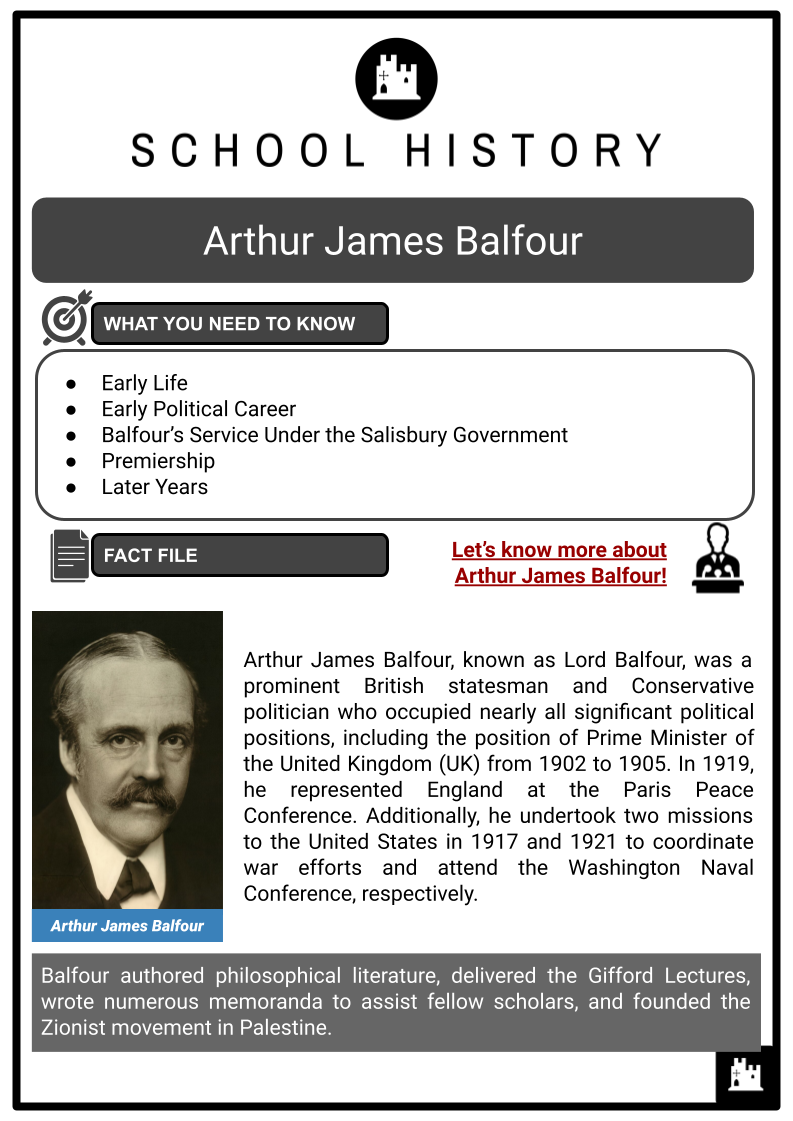
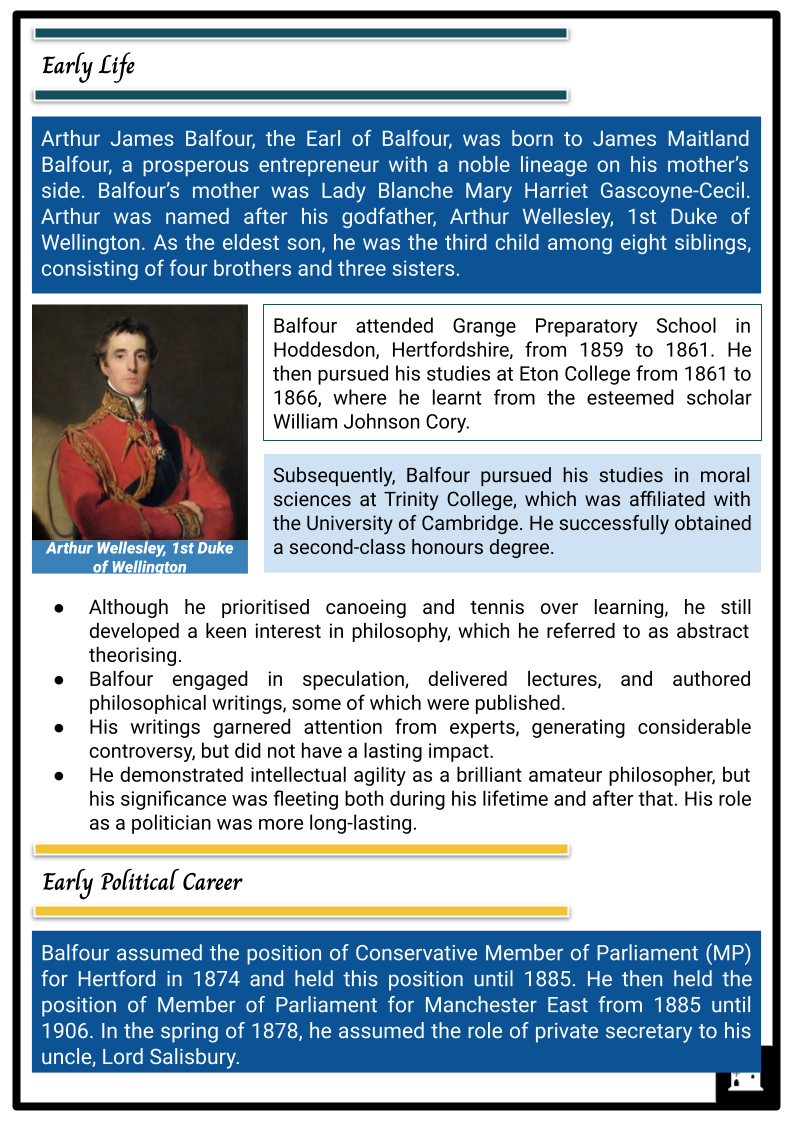
Student Activities



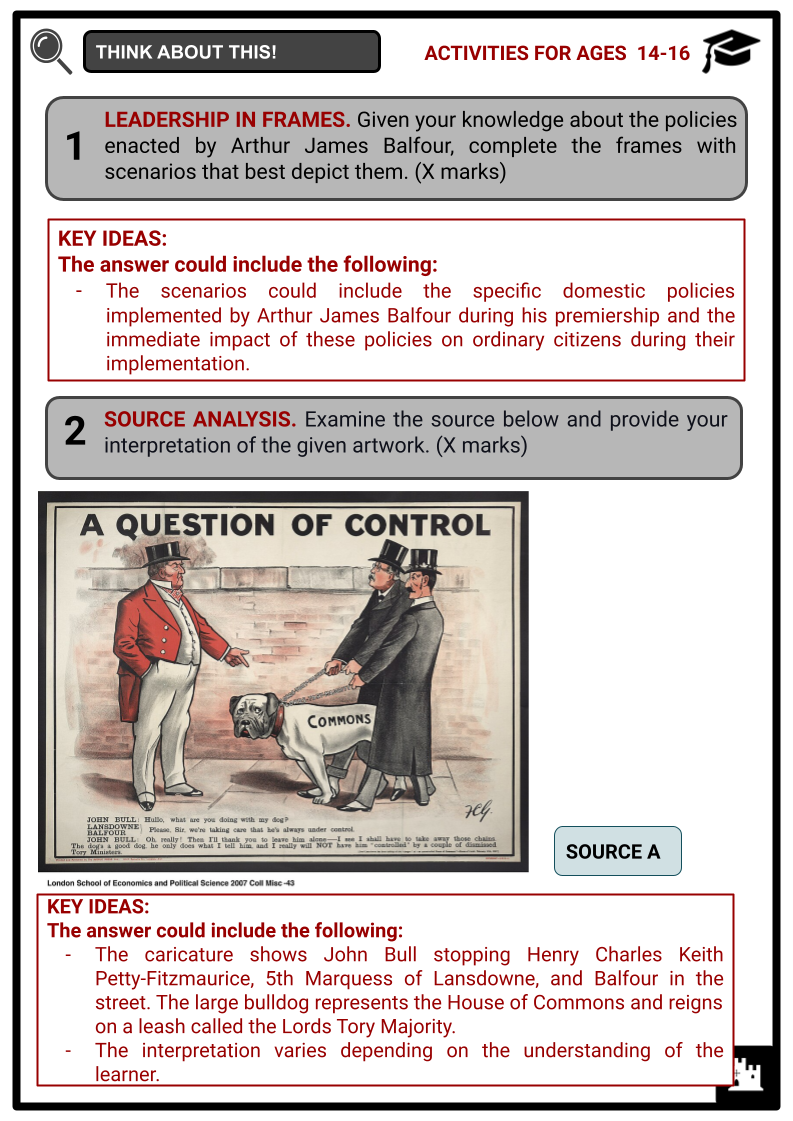
Summary
- Early Life
- Early Political Career
- Balfour’s Service Under the Salisbury Government
- Premiership
- Later Years
Key Facts And Information
Let’s know more about Arthur James Balfour!
Arthur James Balfour, known as Lord Balfour, was a prominent British statesman and Conservative politician who occupied nearly all significant political positions, including the position of Prime Minister of the United Kingdom (UK) from 1902 to 1905. In 1919, he represented England at the Paris Peace Conference. Additionally, he undertook two missions to the United States in 1917 and 1921 to coordinate war efforts and attend the Washington Naval Conference, respectively.
Balfour authored philosophical literature, delivered the Gifford Lectures, wrote numerous memoranda to assist fellow scholars, and founded the Zionist movement in Palestine.
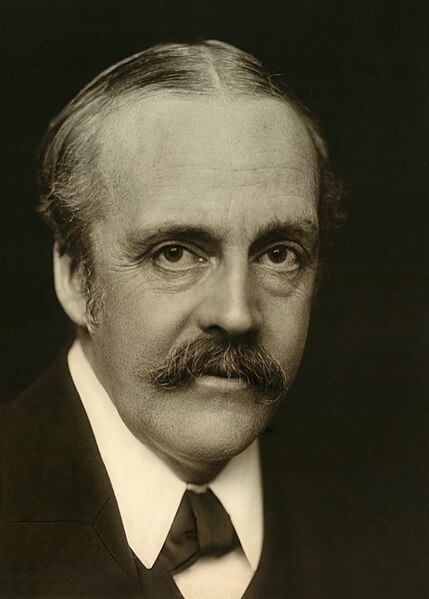
Early Life
- Arthur James Balfour, the Earl of Balfour, was born to James Maitland Balfour, a prosperous entrepreneur with a noble lineage on his mother’s side. Balfour’s mother was Lady Blanche Mary Harriet Gascoyne-Cecil. Arthur was named after his godfather, Arthur Wellesley, 1st Duke of Wellington. As the eldest son, he was the third child among eight siblings, consisting of four brothers and three sisters.
- Balfour attended Grange Preparatory School in Hoddesdon, Hertfordshire, from 1859 to 1861. He then pursued his studies at Eton College from 1861 to 1866, where he learnt from the esteemed scholar William Johnson Cory.
- Subsequently, Balfour pursued his studies in moral sciences at Trinity College, which was affiliated with the University of Cambridge. He successfully obtained a second-class honours degree.
- Although he prioritised canoeing and tennis over learning, he still developed a keen interest in philosophy, which he referred to as abstract theorising.
- Balfour engaged in speculation, delivered lectures, and authored philosophical writings, some of which were published.
- His writings garnered attention from experts, generating considerable controversy, but did not have a lasting impact.
- He demonstrated intellectual agility as a brilliant amateur philosopher, but his significance was fleeting both during his lifetime and after that. His role as a politician was more long-lasting.
Early Political Career
- Balfour assumed the position of Conservative Member of Parliament (MP) for Hertford in 1874 and held this position until 1885. He then held the position of Member of Parliament for Manchester East from 1885 until 1906. In the spring of 1878, he assumed the role of private secretary to his uncle, Lord Salisbury.
- Balfour attended the Congress of Berlin alongside Salisbury, who held the position of foreign secretary at the time. During this time, he acquired his initial exposure to the realm of international politics through his involvement in resolving the Russo-Turkish dispute.
- The Russo-Turkish War denotes a military confrontation between the Ottoman Empire and a pro-Russian alliance comprising Bulgaria, Romania, Serbia and Montenegro. Originating in the burgeoning 19th-century Balkan nationalism, it engaged in conflict throughout the Balkans and the Caucasus.
- According to biographer Sydney Zebel, Balfour’s perceived demeanour in public affairs was that of an amateur or dabbler, without ambition and displaying indifference towards policy matters. Nevertheless, he transformed significantly, becoming a highly engaged political figure.
- According to Zebel, Balfour’s assets encompassed a concealed strong ambition, astute political acumen, adept negotiation skills, a penchant for intrigue, and a meticulous approach to avoiding factionalism.
- Crucially, he strengthened his strong connections with his uncle, Lord Salisbury.
- In addition, he kept amicable connections with Benjamin Disraeli, William Ewart Gladstone and other prominent national figures. After being relieved of his responsibilities as private secretary following the 1880 general election, he became more involved in parliamentary matters.
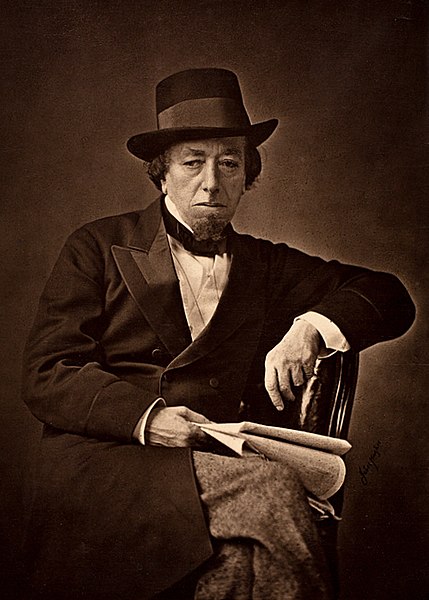
- Balfour was briefly linked to Lord Randolph Churchill, Sir Henry Drummond Wolff, and John Gorst in a political capacity. Their group was known as the Fourth Party.
Balfour’s Service Under the Salisbury Government
- In 1885, Lord Salisbury designated Balfour as the President of the Local Government Board. In the subsequent year, he assumed the position of Secretary for Scotland, accompanied by a cabinet seat. Although these offices provided limited chances for advancement, they served as a form of apprenticeship. Sir Michael Hicks Beach, the Chief Secretary for Ireland, tendered his resignation in the early months of 1887 due to sickness, prompting Salisbury to appoint his nephew as his successor.
- The selection received significant criticism. The Irish Nationalists met it with significant mockery, as they were unaware of Balfour’s remarkable determination, his ability to engage in debates, his skill in launching attacks, and his much greater ability to ignore criticism. Balfour, in his role as the Chief Secretary for Ireland, astounded detractors with his relentless implementation of the Crimes Act.
- The Criminal Law and Procedure (Ireland) Act 1887 was a legislative measure enacted by the Parliament of the United Kingdom. Its purpose was to modify the criminal law in Ireland, granting the authorities increased authority in law enforcement. The legislation granted the Lord Lieutenant of Ireland the authority, through a proclamation, to designate a specific territory in which the legislation would be applicable. The remaining laws applied just to the aforementioned proclaimed areas.
- During his time in Parliament, he resisted the Irish Parliamentary Party’s proposals for Home Rule, perceiving them as manifestations of shallow or erroneous Irish nationalism. Home rule is the government of a colony, dependent country or region by its citizens.
- Balfour advocated for Unionist involvement in Ireland, aligning himself with Joseph Chamberlain’s Liberal Unionists.
- In 1890, Balfour contributed to the welfare of the impoverished by establishing the Congested Districts Board for Ireland. Balfour minimised the influence of Irish nationalism, asserting that the underlying problems were primarily economic.
- Regarding land ownership and control, he believed that by quelling violence and facilitating the sale of property to tenants, Irish nationalism would cease to threaten the cohesion of the UK.
- The Land Law (Ireland) Act of 1881 initiated land sales to Irish tenants, which the Conservatives subsequently expanded through the land purchase scheme in 1885.
- Nevertheless, the stagnation in the agricultural sector resulted in low pricing. Balfour’s approach was to continue selling land and, in 1887, reduce rents to align with the decreased prices.
- Additionally, he implemented measures to safeguard a greater number of tenants from being evicted by their landlords. Balfour significantly increased land sales. The Unionist land purchase campaign of 1903 peaked when Balfour served as Prime Minister and George Wyndham held the position of Irish secretary.
- In 1909, legislation enacted by the Liberal party mandated sales in specific circumstances. The landlords relocated to Great Britain upon selling their properties, relinquishing their political influence in Ireland.
- Following the demise of William Henry Smith in 1891, Balfour assumed the position of First Lord of the Treasury, a notable distinction in British history. He was the sole individual to have simultaneously held the positions of Prime Minister and Leader of the House of Commons. Following the downfall of the administration in 1892, he led the opposition for three years.
- In 1895, following the Conservatives’ resurgence in power, Balfour assumed the positions of Leader of the House and First Lord of the Treasury in collaboration with the Liberal Unionists. His handling of the unsuccessful education proposals in 1896 demonstrated a lack of interest in the tedious task of parliamentary administration.
- However, he successfully facilitated enacting a bill that enhanced local governance in Ireland through the Local Government (Ireland) Act 1898. Additionally, he actively deliberated on international and domestic matters from 1895 to 1900.
Premiership
- Following the retirement of Lord Salisbury on 11 July 1902, Balfour assumed the position of Prime Minister, receiving unanimous acceptance from the Unionist party. The ascension of the new prime minister coincided with the coronation of King Edward VII and Queen Alexandra, as well as the conclusion of the South African War. The Liberal Party remained fragmented over the Boers.
- In international relations, Balfour and his foreign secretary, Henry Charles Keith Petty-Fitzmaurice, 5th Marquess of Lansdowne, successfully enhanced diplomatic ties with France, ultimately establishing the Entente Cordiale in 1904.
- The Entente Cordiale comprised a series of agreements signed on 8 April 1904 between the UK and the French Republic, which significantly improved Anglo-French relations.
- The historical era also witnessed the Russo-Japanese War, during which Britain, a strategic partner of the Japanese, approached a state of conflict with Russia after the Dogger Bank incident.
- Balfour, who had established a connection with Chaim Weizmann, a prominent Zionist leader, since 1906, expressed his opposition to the maltreatment of Jews by the Russian government and progressively endorsed Zionism as a framework for the settlement of European Jews in Palestine.
- Nevertheless, in 1905, he expressed his endorsement of the Aliens Act, which primarily aimed to regulate and limit Jewish immigration originating from Eastern Europe.
- The budget was expected to have a surplus, enabling tax revenue transfer. However, as subsequent events demonstrated, the budget would incite disagreement, supersede other legislative considerations, and indicate the emergence of a novel political force.
- The remission of the shilling import duty on corn by Charles Thomson Ritchie served as a catalyst for Joseph Chamberlain’s advocacy for tariff reform. These were tariffs imposed on imported goods, with a trade advantage granted to the Empire.
- Their purpose was to safeguard British industry from competition, bolster the Empire against the increasing economic influence of Germany and America, and generate cash for social welfare laws and tax increases. Throughout the session, division within the Unionist ranks increased.
- Chamberlain resigned from the Cabinet in late 1903, with Balfour’s consent, in order to advocate for tariff reform. Simultaneously, Balfour endeavoured to reconcile the divergent factions by acquiescing to the resignations of three ministers who advocated for free trade, notably Chancellor Ritchie.
- However, the nearly simultaneous resignation of the Duke of Devonshire, who had previously served as the Liberal Unionist leader during the 1880s, further weakened Balfour’s Cabinet. By 1905, only a tiny number of Unionist MPs remained independent merchants. However, Balfour’s actions had significantly diminished his power within the government.
- In December 1905, Balfour tendered his resignation as Prime Minister, expecting that Liberal leader Henry Campbell-Bannerman would be unable to establish a robust government.
Later Years
- Lord Balfour maintained a state of overall well-being until 1928 and continued to participate actively in tennis until that time. Four years prior, he had served as the inaugural President of the International Lawn Tennis Club of Great Britain.
- By the end of 1928, Balfour had experienced persistent circulatory issues. Before that, he had suffered occasional phlebitis, which had immobilised him by late 1929. On 19 March 1930, Balfour died. Balfour did not want a public funeral, so he was buried on 22 March alongside his family members at Whittingehame. The Church of Scotland conducted the burial ceremony despite his affiliation with the Church of England.
Frequently Asked Questions
- Who was Arthur James Balfour?
Arthur James Balfour was a British statesman who served as Prime Minister of the UK from 1902 to 1905.
- What are some of Arthur Balfour's significant achievements?
Balfour is best known for formulating the Balfour Declaration in 1917, which declared British support for creating a "national home for the Jewish people" in Palestine.
- What other contributions did Arthur Balfour make to British politics?
In addition to his role in the Balfour Declaration, Balfour introduced several important domestic reforms as Prime Minister, including the Education Act of 1902, which established a system of state-funded secondary education in England and Wales.
